
Roč is a village in Istria County, north-west Croatia. Administratively it belongs to the town of Buzet. Roč is considered a historic town rather than a village due to its rich cultural heritage.
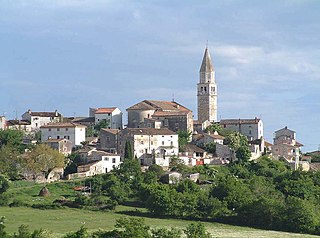
Višnjan is a village and municipality in Istria, Croatia. Višnjan is the site of Višnjan Observatory. The observatory is home of several long-running international summer programs for youth in astronomy, archeology, marine biology and other disciplines.

Buzet is a town in Istria, west Croatia, population 6,133 (2011). The historical core of Buzet dates back to the Middle Ages, and today Buzet is known as the town of truffles.

Medulin is a municipality in the southern part of the Istrian peninsula in Croatia. Medulin is commonly called the Peak or punta of Istria.

Sveta Nedelja is a municipality of twenty villages in Croatia. The three largest villages are municipal seat Nedešćina (604), Štrmac (439) and Šumber. Sveta Nedelja is located on a high plateau above the Raša river valley and in the hinterland of the town of Labin.

Barban is a small town and municipality in the southern part of eastern Istria, Croatia.

Vrsar is a small seaside town and a municipality in Istria, Croatia located 9 kilometers south of Poreč. The historical center is located on top of a hill, including the St. Martin parish church and the 40-meter high bell tower. In the 20th century, the town expanded down the hill, into the surrounding area. It is a popular summer destination with large campsites, private accommodation units and a modern marina. It is the home of the large Koversada Naturist Campsite, the oldest in Istria.

Vodnjan is a town in Istria County, Croatia, located about 10 kilometers north of the largest city in Istria, Pula.

Cerovlje is a village and a municipality in Istria, Croatia.

Kanfanar is a municipality in Istria, Croatia.
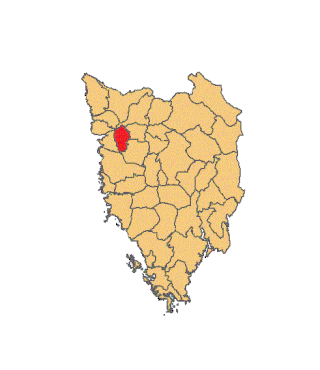
Kaštelir-Labinci is a municipality in Istria, Croatia. Kaštelir and Labinci have been gradually urbanized over the centuries, and have gradually merged into one place. According to historical data, Labinci used to be a bigger place than Kaštela, but today Kašteliri is a bigger place, which is also evident from the name of the place. Throughout history, these two places were under the jurisdiction of Motovun and later Vižinada.
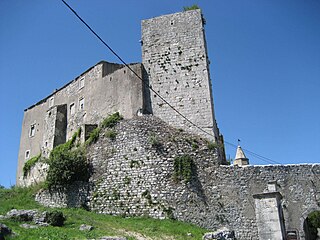
Kršan is a village and municipality in the eastern part of Istria County, Croatia.

Oprtalj is a village and municipality in Istria, Croatia. Oprtalj is a community in the central northern part of Istria County, situated across the Mirna river valley from the village of Motovun, about 20 km northwest of Pazin.

Pićan is a village and municipality in the central part of Istria, Croatia, 12 km southeast of Pazin; elevation 360 m. The chief occupations are agriculture and livestock breeding. It is situated on the D64 state road (Pazin-Kršan-Vozilići). There is a railway station on the former Lupoglav – Raša railway.
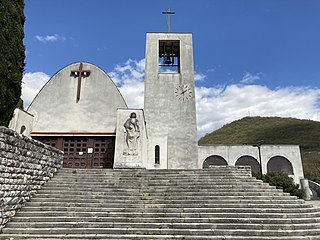
Raša is a municipality in the inner part of the Raška Inlet in the south-eastern part of Istria, Croatia. Raša lies 4.5 kilometres (2.8 mi) southwest of Labin at an elevation of 10 m (33 ft). Raša was named after the river of the same name.

Svetvinčenat is a village and municipality in the south of the central part of Istria, Croatia, about 16 km north of Vodnjan; elevation 250 m.
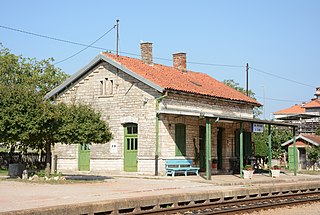
Sveti Petar u Šumi is a village and municipality (općina) in Istria County, Croatia.

Vižinada is a village and municipality in the interior of the western part of Istria, Croatia. It is 17 km northeast of Poreč, with an elevation of 400 m. The economy is agriculture-based.

Tar-Vabriga is a municipality in the Istria County, Croatia, approximately 7 km north of Poreč. The municipality has been established in 2006.
Galižana is a village in Istria, Croatia. It is part of the City District of Vodnjan, Istria County.






















